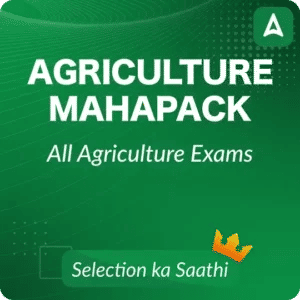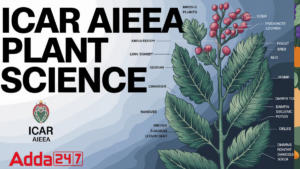Table of Contents
The ICAR AIEEA PG Agronomy Syllabus 2025 has been designed to assess candidates’ knowledge in agronomy and related agricultural sciences. The syllabus covers essential topics for admission into postgraduate programs at India’s leading agricultural universities. Aspirants preparing for the ICAR AIEEA PG Agronomy exam must thoroughly understand the prescribed ICAR AIEEA PG Agronomy Syllabus to build a strong foundation and improve their chances of securing a seat in a reputed institution.
ICAR AIEEA PG Agronomy Exam Pattern 2025
The ICAR AIEEA PG Agronomy Exam 2025 will be conducted in an online Computer-Based Test (CBT) mode. The paper will consist of 120 multiple-choice questions (MCQs), each carrying four marks, making the maximum total 480 marks. For every wrong answer, one mark will be deducted as part of the negative marking scheme. The total duration of the exam will be 2 hours. The exam will primarily focus on testing the candidates’ conceptual understanding, analytical ability, and application skills in agronomy and associated subjects.
| ICAR AIEEA PG Agronomy Exam Pattern | |
| Exam Name | ICAR AIEEA PG Agronomy |
| Conducting Body | National Test Agency (NTA) |
| Duration of Exam | 2 hours |
| Mode of Exam | Online |
| Total Number of Questions | 120 |
| Total marks | 480 |
ICAR AIEEA PG Agronomy Syllabus 2025
The ICAR AIEEA PG Agronomy Syllabus 2025 highlights a wide range of topics. To perform well in the examination, candidates should be well-versed with the syllabus. The given section provides the detailed unit-wise ICAR AIEEA PG Syllabus for Agronomy.
Unit-I: General: Importance of Agriculture in national economy; basic principles of crop production; cultivation of rice, wheat, chickpea, pigeon-pea, sugarcane, groundnut, rapeseed and mustard, potato. Major soils of India, role of NPK, and their deficiency symptoms. Structure and function of cell organelles; mitosis and meiosis; Mendelian genetics: elementary knowledge of photosynthesis; respiration, photorespiration, and transpiration; structure and functions of carbohydrates, proteins, nucleic acids, enzymes, and vitamins. Major pests and diseases of rice, wheat, cotton, chickpea, sugarcane, and their management. Important rural development programmes in India; organisational set up of agricultural research, education, and extension in India; Elements of statistics.
Unit-II: Principles of Agronomy, Crop ecology and geography and Agricultural Meteorology: Agronomy –meaning and scope, National & International agricultural research institutes in India, Agro climatic zones of India, Tillage, crop stand establishment and planting geometry and their effect on crop, Physiological limits of crop yield and variability in relation to ecological optima, organic farming, Precision farming, Integrated farming systems, Principles of field experimentation. Principles of crop ecology and crop adaptation, climate shift and its ecological implications, Agro-ecological regions in India, Geographical distribution of crop plants, Greenhouse effect, Climatic factors and their effect on plant processes and crop productivity, Role of GIS and GPS in agriculture. Weather & climate, Earth’s atmosphere, Solar radiation, Atmospheric temperature, and global warming. Crops and atmospheric humidity, Weather forecasting.
Unit-III: Field crops: Origin, distribution, economic importance, soil and climatic requirement, varieties, cultural practices and yield of cereals ( rice, wheat, maize, sorghum, pearl millet, minor millets, barley), pulses (chickpea, lentil, peas, Pigeon pea, mungbean, urdbean), oilseeds (groundnut, sesame, soybean, rapeseed & mustard, sunflower, safflower, linseed), fiber crops (cotton, jute, sun hemp), sugar crops(sugarcane), fodder & forage crops (sorghum, maize, napier, berseem, Lucerne, oats), medicinal & aromatic plants (menthe, lemon grass and isabgol) and commercial crops(potato, tobacco).
Unit-IV: Weed management: Principles of weed management, Classification, biology and ecology of weeds, crop weed competition and allelopathy, concepts and methods of weed control, Integrated weed management, Classification, formulations, selectivity and resistance of herbicides, Herbicide persistence in soil and plants, Application methods and equipments, Weed flora shifts in cropping systems, Special and problematic weeds and their management in cropped and non-cropped situations, Weed management in field crops.
Unit-V: Water management: Principles of irrigation, Water resources and irrigation development in India, Water and irrigation requirements, Concepts and approaches of irrigation scheduling, Methods of irrigation, Measurement of irrigation water, application, distribution and use efficiencies, Conjunctive use of water, Irrigation water quality and its management, water management in major field, crops (rice, wheat, maize, groundnut, sugarcane) Agricultural drainage.
Unit-VI: Soil fertility and fertilizer use: Essential plant nutrients and their deficiency symptoms, concept of essentiality of plant nutrients, Indicators of soil fertility and productivity, Fertilizer materials and their availability to plants, slow release fertilizers, Nitrification inhibitors, Principles and methods of fertilizer application, Integrated nutrient management, site specific nutrient management.
Unit-VII: Dryland Agronomy: Characteristics of Dryland farming and delineation of Dryland tracts, constraints of Dryland farming in India, Types of drought and their management, contingency crop planning and mid-season corrections for aberrant weather and its recycling. Watershed management.
Unit-VIII: Problem soils: Problem soils and their distribution in India, Characteristics and reclamation of these soils, Crop production techniques in problem soils.
Unit-IX: Sustainable land use systems: Sustainable agriculture: parameters and indicators, Conservation agriculture, safe disposal of agri-industrial waste for crop production, Agro-forestry systems, shifting cultivation, Alternate land use systems, Wastelands and their remediation for crop production
| Also Check |
| ICAR AIEEA PG Horticulture Syllabus |
| ICAR AIEEA PG Plant Science Syllabus |
| ICAR AIEEA PG Previous Year Question Paper |





 MPSC Livestock Development Officer Recru...
MPSC Livestock Development Officer Recru...
 ICAR AIEEA PG Plant Science Syllabus 202...
ICAR AIEEA PG Plant Science Syllabus 202...
 MPPSC Food Safety Officer Notification 2...
MPPSC Food Safety Officer Notification 2...


 Adda247 Job portal has complete information about all Sarkari Jobs and Naukri Alerts, its latest recruitment notifications, from all state and national level jobs and their updates.
Adda247 Job portal has complete information about all Sarkari Jobs and Naukri Alerts, its latest recruitment notifications, from all state and national level jobs and their updates.